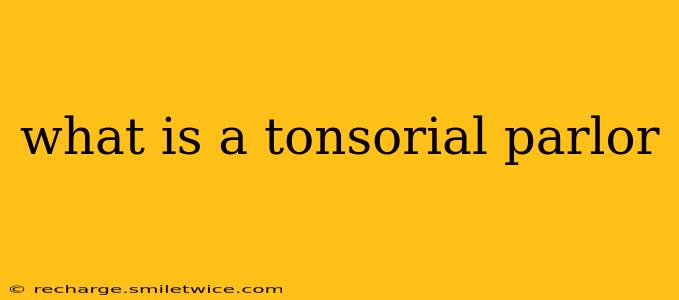The term "tonsorial parlor" might sound like something out of a historical novel, and that's because it largely is. It's an antiquated term for a barbershop. While you won't see many signs boasting "Tonsorial Parlor" today, understanding the term provides a fascinating glimpse into the history and evolution of men's grooming.
This article will explore the origins of the term, its historical significance, and how it relates to the modern barbershop experience. We'll also answer some frequently asked questions surrounding this intriguing phrase.
What Does "Tonsorial" Mean?
The word "tonsorial" derives from the Latin word "tonsor," meaning "barber" or "one who shears." Therefore, a "tonsorial parlor" literally translates to a "barber's shop" or a place where hair is cut and styled. The term evokes a sense of elegance and formality often associated with older establishments.
What's the Difference Between a Tonsorial Parlor and a Modern Barbershop?
While the core function remains the same—haircutting and styling—the atmosphere and services offered differ significantly. Tonsorial parlors of the past were often more formal, upscale establishments, sometimes offering a wider range of services beyond basic haircuts, possibly including shaves with straight razors, manicures, and even some early forms of facial treatments.
Modern barbershops, while some maintain a classic feel, are often more casual and diverse in their offerings. They might include specialized haircuts, beard grooming, hot towel shaves, and even hair product sales.
Why is the Term "Tonsorial Parlor" Rarely Used Today?
The term fell out of favor simply due to its formality and the changing language of the times. "Barbershop" is shorter, simpler, and more easily understood by the general public. The evolution of language naturally leads to the adoption of more concise and contemporary terms.
What Services Were Offered in a Traditional Tonsorial Parlor?
Traditional tonsorial parlors offered a range of services centered around men's grooming. These could include:
- Haircuts: A variety of styles, tailored to individual preferences.
- Shaves: Often using straight razors, providing a close and precise shave.
- Beard Trimming & Styling: Maintaining and shaping beards.
- Hair Products: Selling pomades, oils, and other hair care products.
- Manicures: Basic nail care for hands.
Some more upscale establishments may have even offered additional services such as scalp massages or other forms of grooming treatments.
Are There Any Tonsorial Parlors Still in Existence?
While extremely rare, you might find a few barbershops that still use the term "tonsorial parlor" in their branding, often to evoke a sense of nostalgia or to highlight a commitment to traditional barbering techniques. However, it is primarily a historical term, not a widely used descriptor for modern barbershops.
What's the Significance of the Term in the Context of History?
The term "tonsorial parlor" provides a window into the past, reflecting a time when barbershops held a more prominent social role in communities. They served as gathering places for men, fostering conversation and social interaction. The formality of the term underscores the perceived importance and sophistication of the services offered.
In conclusion, while the term "tonsorial parlor" is largely a historical artifact, understanding its meaning allows us to appreciate the evolution of men's grooming and the enduring legacy of the barbershop. It's a testament to the enduring connection between personal care and social interaction.
